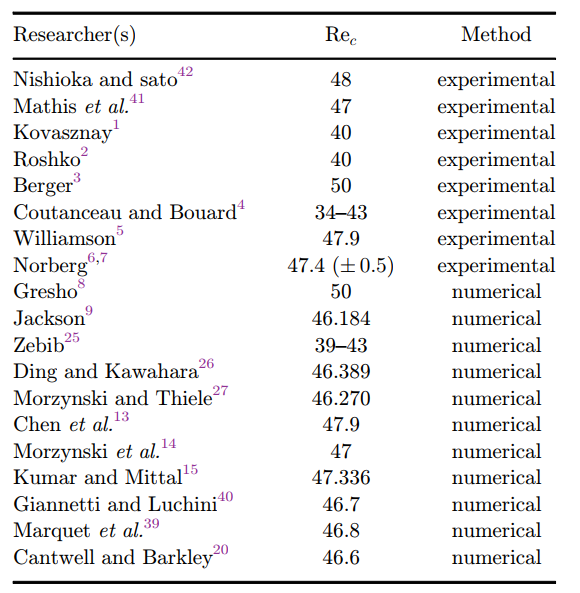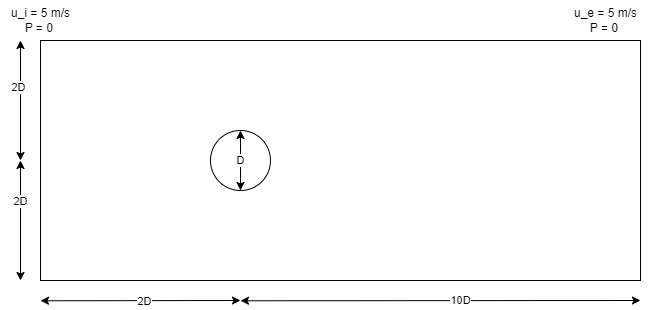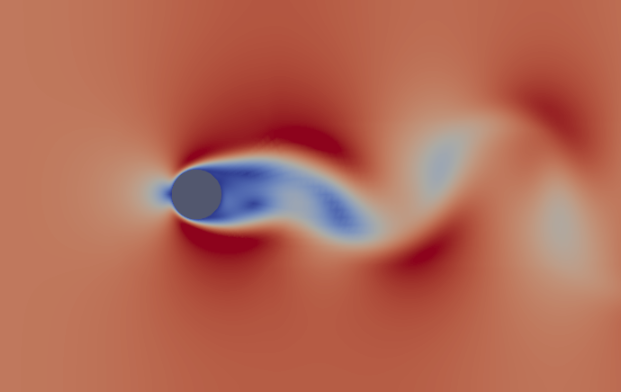1.Theory and Background:
We want to tackle a classical Fluid Dynamic Problem - Laminar flow of a 2D Cylinder
Critical Reynolds Number would be used to determine accuaracy of our implimentation
as there is consensus on this value.
 Source : Fezia 2018
Source : Fezia 2018
Choice of Software:
Ansys Fluent vs OpenFoam:
Parameters to Consider -
- Automation
- Meshing
- Community Support and Code Ba
2.Simulation:
Inlet Velocity is maintained at 5 m/s while we change Kinematics Viscosity
Boundary Conditions - At Cylinder wall u = v = 0 m/s At inlet u = 5 m/s V = 0 m/s

Max Skewness 0.629 < 0.8
Cell count ~ 18,000

2. Simulation:
Using OpenFoam for ease of Automation / Solver - icoFoam / The solver uses the PISO algorithim to solver the continuity equation
and momnentum equation
where is Velocity and is Kinematic pressure
Integration Time: 0.001 Simulation Time: 5 sec
3. Implementation Challenges
-
Boundary Conditions on Top and Bottom Walls and Outlet
- Symmetry Plane vs No Slip
-
Step Time and Simulation Time
- Sampling Frequency to detect Strouhal Frequency
-
Mesh Clarity for Boundary Layer
- Balancing Mesh Thickness near Boundary layer and Skewness
-
Post Processing
4. Results and Discussion
 The middle circle is peak frequency where as the 2 cricles abovce and below it are to judge the interval size
The middle circle is peak frequency where as the 2 cricles abovce and below it are to judge the interval size
Total Simulation Run Time: ~2 hours
Mean Error 8.977 %
Critical Reynold Number: 46 - 49
Click to watch Video for Reynolds number of 100

6. Project Takeaways
-
Strouhal Number is highly sensitive parameter
-
Computational Fluid Dynamics Require
- Appropriate Meshing
-
Appropriate Time Step
-
Understanding Dynamics of the Problem
7. References
-
Fezai, Salwa & Oueslati, Fakher & Ben-Cheikh, Nader & Beya, Brahim. (2018). Sensitivity of wake parameters to diameter changes for a circular cylinder. International Journal of Modern Physics C. 29. 25. 10.1142/S0129183118500870.
-
Williamson, C.H., & Brown, G.L. (1998). A SERIES IN 1/√Re TO REPRESENT THE STROUHAL–REYNOLDS NUMBER RELATIONSHIP OF THE CYLINDER WAKE. Journal of Fluids and Structures, 12, 1073-1085.
-
Griffith, Martin & Leontini, J. & Thompson, Mark & Hourigan, Kerry. (2011). Vortex shedding and three-dimensional behaviour of flow past a cylinder confined in a channel. Journal of Fluids and Structures - J FLUID STRUCTURE. 27. 855-860. 10.1016/j.jfluidstructs.2011.02.007.